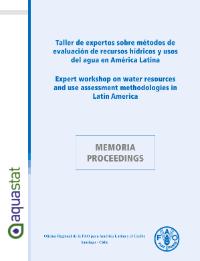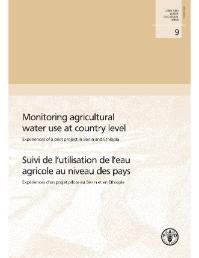Focal point
Location
The Food and Agriculture Organization of the United Nations leads international efforts to defeat hunger. Serving both developed and developing countries, FAO acts as a neutral forum where all nations meet as equals to negotiate agreements and debate policy. FAO is also a source of knowledge and information. We help developing countries and countries in transition modernize and improve agriculture, forestry and fisheries practices and ensure good nutrition for all. Since our founding in 1945, we have focused special attention on developing rural areas, home to 70 percent of the world's poor and hungry people.
Members:
Resources
Displaying 2671 - 2675 of 5074Taller de expertos sobre métodos de evaluación de recursos hídricos y usos del agua en América Latina -
Information on water use is required for political, economic and academic decision making on issues affecting everyone?s life. Owing to fi nancial constraints, it is diffi cult to have complete and comprehensive information on everything related to water. Techniques and methodologies are, therefore, used to affordably maximize control. To improve understanding of the different techniques and methodologies used to generate information, the AQUASTAT team sent thematic questionnaires to approximately 170 countries in April 2009.
Taller de expertos sobre métodos de evaluación de recursos hídricos y usos del agua en América Latina -
Information on water use is required for political, economic and academic decision making on issues affecting everyone?s life. Owing to fi nancial constraints, it is diffi cult to have complete and comprehensive information on everything related to water. Techniques and methodologies are, therefore, used to affordably maximize control. To improve understanding of the different techniques and methodologies used to generate information, the AQUASTAT team sent thematic questionnaires to approximately 170 countries in April 2009.
Suivi de l’utilisation de l’eau agricole au niveau des pays
As water becomes scarcer in many countries, governments increasingly have to deal with the considerable challenges of water management. Sound information on water vailability and use is key to shaping water policies that aim to provide equitable and sustainable use of increasingly scarce water resources. Accurate information on agricultural water withdrawal is particularly important to planners and decision-makers involved in water management, as agriculture represents the largest water us er in many countries, representing about 70 percent of total withdrawal worldwide.
Suivi de l’utilisation de l’eau agricole au niveau des pays
As water becomes scarcer in many countries, governments increasingly have to deal with the considerable challenges of water management. Sound information on water vailability and use is key to shaping water policies that aim to provide equitable and sustainable use of increasingly scarce water resources. Accurate information on agricultural water withdrawal is particularly important to planners and decision-makers involved in water management, as agriculture represents the largest water us er in many countries, representing about 70 percent of total withdrawal worldwide.
Suivi de l’utilisation de l’eau agricole au niveau des pays
As water becomes scarcer in many countries, governments increasingly have to deal with the considerable challenges of water management. Sound information on water vailability and use is key to shaping water policies that aim to provide equitable and sustainable use of increasingly scarce water resources. Accurate information on agricultural water withdrawal is particularly important to planners and decision-makers involved in water management, as agriculture represents the largest water us er in many countries, representing about 70 percent of total withdrawal worldwide.








